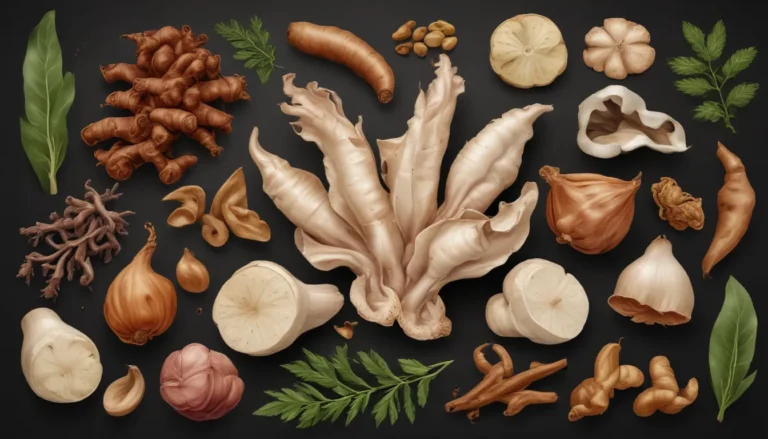The pictures in our articles might not always show exactly what the text is talking about. We use these images to make the article more interesting and eye-catching. They are there to add to the text, but not to replace it or show every detail.
Are you ready to explore the vibrant and versatile world of lettuce? Lettuce, a popular leafy green enjoyed by people all over the globe, brings a fresh and crisp element to a variety of dishes. But did you know that there's more to lettuce than meets the eye? In this enlightening article, we will delve into 13 intriguing facts about lettuce that will captivate both food enthusiasts and casual eaters alike. From its ancient origins to its various types and health benefits, lettuce is a fascinating vegetable that has stood the test of time in culinary culture. Let's embark on a journey to uncover the hidden secrets of this humble yet remarkable leafy green.
Key Takeaways:
- Lettuce is a low-calorie, high-water vegetable that's been cultivated for over 2,000 years. Packed with vitamins, antioxidants, and fiber, lettuce is a refreshing and nutritious addition to any meal.
- Lettuce comes in various types, each with its own unique texture and flavor. Whether eaten raw in salads or cooked in dishes, lettuce is a versatile and healthy ingredient that can be enjoyed year-round.
Lettuce: A Member of the Daisy Family
Did you know that lettuce belongs to the Asteraceae family, which also includes popular vegetables like sunflowers and daisies? This family is known for its composite flowers that are made up of multiple smaller flowers clustered together.
A Long History of Cultivation
The cultivation of lettuce dates back to ancient Egypt and Greece, where it was highly valued for its medicinal properties and used as a symbol of prosperity and fertility. With a history spanning over 2,000 years, lettuce has been a staple in culinary traditions worldwide.
Variety is the Spice of Life
Lettuce comes in various types, including crisphead lettuce (such as iceberg lettuce), romaine lettuce, butterhead lettuce, and loose-leaf lettuce. Each type offers its own unique texture and flavor profile, adding depth and versatility to your culinary creations.
A Nutrient-Packed Veggie
Low in calories and high in water content, lettuce is a great choice for those looking to maintain a healthy weight or manage their calorie intake. Additionally, lettuce is a good source of vitamins and minerals, making it a nutrient-rich addition to your diet.
The Hydrating Power of Lettuce
With its high water content of over 90%, lettuce helps keep the body hydrated and promotes healthy digestion. The crisp and refreshing texture of lettuce is not only delicious but also beneficial for your overall well-being.
Vitamin K: A Crucial Component
Vitamin K plays a crucial role in blood clotting and bone health, and lettuce is a natural source of this important vitamin, particularly in darker varieties like romaine lettuce. Including lettuce in your diet can help support these vital bodily functions.
Year-Round Accessibility
Lettuce is a cool-weather crop that can be grown throughout the year, making it easily accessible and a popular choice for home gardeners. Whether you're growing it in your backyard or purchasing it at the store, lettuce is always in season.
Culinary Versatility
While lettuce is commonly consumed raw in salads, it can also be cooked to enhance its flavor and texture. Sautéing or grilling lettuce brings out a different dimension of flavor, offering a unique twist on this versatile vegetable.
A Mild and Refreshing Flavor
The taste of lettuce varies depending on the variety, but it generally has a mild and refreshing flavor with a subtle bitterness. Its crisp texture adds a satisfying crunch to dishes, making it a delightful addition to salads, wraps, and more.
Fiber for Digestive Health
Dietary fiber is essential for maintaining a healthy digestive system and promoting feelings of fullness. Lettuce contains a good amount of fiber, aiding in digestion and overall gut health.
Antioxidant Powerhouse
Lettuce is rich in antioxidants, including beta-carotene and vitamin C, which help protect the body against damage from harmful free radicals. Adding lettuce to your diet can provide a boost of antioxidants to support your overall health.
Growing Without Soil
Lettuce is well-suited for hydroponic cultivation, a method of growing plants without soil using nutrient-rich water instead. Its shallow root system makes lettuce ideal for this type of farming, offering a sustainable and efficient way to produce this leafy green.
Lettuce in the Kitchen
From classic Caesar salads to crunchy lettuce wraps, lettuce can be used in a wide range of culinary creations. Its versatility and fresh flavor make it a favorite ingredient in kitchens worldwide, adding a vibrant touch to every dish.
Explore the World of Lettuce
These 13 fascinating facts about lettuce only scratch the surface of the wonders of this leafy green. From ancient origins to modern culinary uses, lettuce has earned its place as a staple in our diets. So, the next time you enjoy a salad or a sandwich, savor the richness of lettuce's history and the abundance of nutrients it offers.
Conclusion
In conclusion, lettuce is a versatile and nutritious vegetable that brings a crisp and refreshing element to every meal. Whether you're enjoying it in a salad, cooked dish, or wrap, lettuce offers a wealth of health benefits and culinary possibilities. Take a moment to appreciate the wide variety of lettuce types, their unique characteristics, and the rich history behind this beloved leafy green. Let lettuce continue to inspire your culinary adventures and nourish your body and soul.
FAQs
Q: Is lettuce good for weight loss?
A: Yes, lettuce is an excellent choice for weight loss due to its low calorie content and high fiber, helping you feel full without consuming excess calories.
Q: Can I freeze lettuce?
A: Freezing lettuce is not recommended as it can cause the leaves to become limp and lose their crispness. It's best enjoyed fresh for optimal flavor and texture.
Q: Are all lettuce types suitable for salads?
A: While most lettuce varieties are used in salads, some types like iceberg lettuce are better suited for adding crunch to sandwiches or wraps. Others, like romaine lettuce, are perfect for salads due to their sturdy leaves.
Q: What are the health benefits of lettuce?
A: Lettuce is rich in vitamins A, C, and K, as well as folate, iron, and antioxidants. It promotes healthy digestion, boosts immunity, and may have anti-inflammatory properties.
Q: Can lettuce be grown at home?
A: Yes, lettuce can be grown at home in containers or garden beds. It's a fast-growing vegetable that's relatively easy to cultivate, allowing you to enjoy fresh lettuce straight from your garden.
Immerse yourself in the world of lettuce and discover the wonders of this versatile leafy green. With its rich history, diverse varieties, and health benefits, lettuce has earned its place as a beloved ingredient in kitchens worldwide. Whether you're a seasoned lettuce enthusiast or a curious newcomer, let the vibrant flavors and nutritional benefits of lettuce inspire your culinary creations. Lettuce, with its crisp texture and refreshing taste, invites you to savor every bite and explore the endless possibilities of this humble yet remarkable vegetable. So, embrace the beauty of lettuce and let it brighten your meals with its nutritious goodness.






